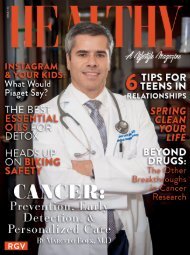Healthy RGV Issue 103 - What All Men Need to Know
You also want an ePaper? Increase the reach of your titles
YUMPU automatically turns print PDFs into web optimized ePapers that Google loves.
COVER STORY · JUNE 2017<br />
WHAT<br />
ALL MEN<br />
NEED TO<br />
KNOW<br />
Cancer affects men in all<br />
walks of life and doesn’t<br />
discriminate by age. One<br />
in two men will develop<br />
some type of cancer in his lifetime. Even for<br />
cancers typically diagnosed in later years, like<br />
lung cancer, prevention begins early.<br />
The reluctance of many men <strong>to</strong> visit a doc<strong>to</strong>r<br />
or undergo annual physical examinations<br />
prevents their best chances for early cancer<br />
detection and effective treatment. Every year,<br />
more than 300,000 men in the United States<br />
and nearly 45,000 in Texas alone lose their<br />
lives <strong>to</strong> cancer. A few of the most common<br />
kinds of cancer among men are prostate<br />
cancer, lung cancer, and colorectal cancer.<br />
Lifestyle habits contribute <strong>to</strong> your future<br />
health, so limiting risky behaviors and<br />
jumpstarting good ones is extremely<br />
important. If you’re a man, statistics indicate<br />
you’re more likely <strong>to</strong> smoke, drink, and carry<br />
excess weight, all of which increase cancer<br />
risk.<br />
You can take control of your health and<br />
reduce your cancer risk by following some<br />
simple guidelines.<br />
GO SEE YOUR DOCTOR –<br />
REGULARLY<br />
There’s a certain bold stubbornness some<br />
men tend <strong>to</strong> exude when someone — like<br />
a spouse or loved one — suggests how <strong>to</strong><br />
spend their free time, not <strong>to</strong> mention seeing<br />
a doc<strong>to</strong>r. But your loved ones actually are<br />
trying <strong>to</strong> save your life. You should establish<br />
a relationship with your doc<strong>to</strong>r and make<br />
appointments for regular physical exams and<br />
screenings.<br />
NOT EVERY MAN GETS<br />
PROSTATE CANCER<br />
For most men, prostate cancer has the<br />
highest awareness rate – and that’s a good<br />
thing. It’s the third deadliest cancer in the<br />
U.S. for men, and is often called “the silent<br />
killer” because it often shows no symp<strong>to</strong>ms.<br />
However, a prostate cancer diagnosis is by no<br />
means a death sentence, thanks <strong>to</strong> advanced<br />
treatments and increasing awareness of<br />
screening.<br />
<strong>Men</strong> should discuss with their physicians<br />
the risks and benefits of prostate cancer<br />
screening <strong>to</strong> make an informed decision<br />
about testing. Most men should consider<br />
regular prostate screenings beginning at age<br />
50. <strong>Men</strong> at high risk (African Americans and<br />
men with a family his<strong>to</strong>ry of prostate cancer<br />
before age 65) should consider testing<br />
beginning at age 45. Consider screening at<br />
age 40 if more than one first-degree relative<br />
is diagnosed before 65. Prostate screenings<br />
can include:<br />
• The prostate-specific antigen (PSA)<br />
blood test measures levels of a protein<br />
produced by the prostate. Higher PSA<br />
levels indicate a higher likelihood you<br />
have cancer but other reasons may<br />
elevate PSA levels.<br />
• The DRE (digital rectal exam) also tests<br />
for prostate cancer.<br />
AVOID TOBACCO<br />
IN ANY FORM<br />
Lung cancer is responsible for the most<br />
cancer-related deaths in Texas. Only 15<br />
percent of men lung cancer patients live<br />
more than five years beyond their initial<br />
diagnosis. Tobacco smoke is the most<br />
important risk fac<strong>to</strong>r for lung cancer, as it is<br />
thought <strong>to</strong> cause most lung cancer deaths.<br />
The more a person is exposed <strong>to</strong> smoke, the<br />
greater their risk of developing lung cancer.<br />
22 HEALTHY MAGAZINE

















